

APHC has pledged support for National Burn Awareness Day, which is being run today by the British Burn Association.
The event, run for the first time last year, aims both to help raise awareness of the number of people burned each day - the vast majority of which are preventable - and to promote good first aid practice.
On average, more than 330 people are seen in emergency departments with a burn every day in England and Wales. 110 of these are children. As such, each of the 22 burn services in England and Wales are making efforts to increase general awareness concerning burn injuries and engage with as many agencies and organisations as possible to take forward the burn prevention message.
APHC is particularly reminding members of the plumbing and heating industry to remember the dangers of hot water, which is the main cause of burns in England and Wales.
“Across the board for children and adults, scald burns are the most common cause of burn injury, representing 43% of acute burn injuries which includes spills and scalds from hot water systems”, said Alison Tweddle, operations manager at the Children’s Burns Trust.
With much industry advice on the treatment of Legionella recommending that water should be stored at 60°C or higher and distributed at 50°C or higher to kill bacteria, there is a real danger that the risk of scalding could be increased. Fitting an approved anti-scald device to hot water installations negates the life-threatening risk of scalding posed by coming into contact with high temperature hot water.
In case of an emergency, the British Burn Association encourages people to follow the “Cool, Call, Cover” procedure: 1) Cool the burn with running cold tap water for 20 minutes and remove all clothing and jewellery (if easy to take off), 2) Call 999, 111 or local GP for expert help and 3) Cover with cling film or a sterile, non-fluffy dressing or cloth and make sure the patient is kept warm.
John Thompson, chief executive at APHC, said: “The vast number of burns in England and Wales are preventable, which is why it’s so important to raise awareness about the huge numbers of people burned each day and promote basic first aid advice.
“With the majority of burns resulting from scalding, we’re particularly urging members of the plumbing and heating industry to take essential precautions when completing new installations, such as fitting TMVs [Thermostatic Mixing Valves] on new domestic bath installations as required by legislation and encouraging customers to consider the use of TMVs on existing installations and in other high risk situations.”
If you'd like to keep up-to-date with the latest developments in the heating and plumbing industry, why not subscribe to our weekly newsletters? Just click the button below and you can ensure all the latest industry news and new product information lands in your inbox every week.